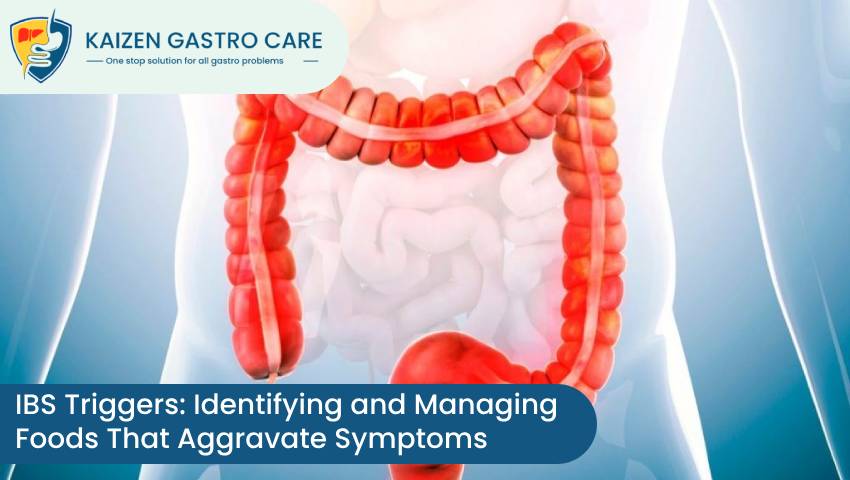
- 14/03/2024
- Kaizen Gastro Care
- 0 Comments
- Gut Health
IBS Triggers: Identifying and Managing Foods That Aggravate Symptoms
Irritable Bowel Syndrome (IBS) is a common disorder that disrupts the digestive system, causing painful symptoms like bloating, cramps, diarrhea, and constipation. While the actual cause of IBS remains unknown, identifying and managing food triggers can significantly improve your quality of life.
At Kaizen Gastro Care, we understand the importance of identifying and addressing these triggers to improve the quality of life for individuals with IBS.
Identifying IBS Triggers:
- Keep a Food Diary: Tracking your diet and symptoms in a food diary can provide useful insights into possible triggers. Note down everything you eat and drink, along with any symptoms experienced later. This can help you identify the exact foods that aggravate your symptoms.
- Common Culprits: While IBS triggers can vary from person to person, certain foods are known to commonly worsen IBS symptoms. These include:
- High-FODMAP Foods: Fermentable Oligosaccharides, Disaccharides, Monosaccharides, and Polyols (FODMAPs) are certain types of carbohydrates that can be difficult to digest for some people with IBS. Foods high in FODMAPs include certain fruits (such as apples and cherries), vegetables (like onions and garlic), dairy products, and sweeteners like sorbitol and mannitol.
- Gluten: While not all people with IBS are sensitive to gluten, some may experience irritated symptoms after consuming gluten-containing foods like wheat, barley, and rye. This sensitivity is often seen in individuals with both IBS and non-celiac gluten sensitivity.
- Dairy Products: Lactose intolerance is common among people with IBS, leading to signs such as bloating, gas, and diarrhea after consuming dairy products. Even those who are not lactose intolerant may find that dairy worsens their IBS symptoms.
- High-Fat Foods: Foods high in fat can be more difficult for the body to digest, leading to symptoms such as bloating and diarrhea in individuals with IBS. Fried foods, fatty meats, and rich desserts are examples of high-fat foods that may trigger symptoms.
- Spicy Foods: Spices and spicy foods can upset the digestive tract and trigger symptoms in some people.
- Caffeine and Alcohol: Both caffeine and alcohol can stimulate the digestive system and lead to distress for people with IBS.
Identifying Personal Triggers:
While there are common triggers for IBS, it’s crucial to identify your triggers through a process of trial and error. Keeping a food diary can help track your symptoms and recognize patterns. Note down what you eat, when you eat it, and any symptoms you experience afterward. Over time, you may start to notice correlations between certain foods and your symptoms.
Managing IBS Triggers:
Once you’ve identified your food triggers, addressing them effectively can help relieve symptoms and enhance your quality of life. Here are some techniques suggested by the expert Dr. Vikrant Kale at Kaizen Gastro Care:
- Follow a Low-FODMAP Diet: Consult with registered Dt. Bhushan Khedkar, & consider following a low-FODMAP diet, which affects temporarily restricts high-FODMAP foods before gradually reintroducing them to identify specific triggers.
- Consider Gluten-Free Alternatives: If gluten aggravates your symptoms, think about switching to gluten-free foods such as quinoa, rice, and gluten-free oats.
- Experiment with Dairy Alternatives: If dairy causes your symptoms, try substituting dairy milk with lactose-free milk, almond milk, or other dairy alternatives.
- Eat Smaller, More Frequent Meals: Try eating smaller, more regular meals throughout the day as opposed to large ones, which might strain the digestive system.
- Stay Hydrated: Constipation is a frequent symptom of IBS that can be controlled by drinking lots of water. Try to get in eight glasses or more of water each day.
- Manage Stress: Stress can worsen IBS symptoms, so it’s crucial to find methods to manage stress effectively. Deep breathing exercises, yoga, and meditation are a few examples of relaxation techniques.
Conclusion:
Identifying and managing IBS triggers is crucial for effectively managing symptoms and improving quality of life. At Kaizen Gastro Care, we understand the unique challenges faced by individuals with IBS and offer personalized treatment plans to help you navigate your condition. By working closely with our experienced IBS specialist in Pune, India, and implementing strategies to address your triggers, you can take control of your IBS symptoms and live a happier, healthier life.
